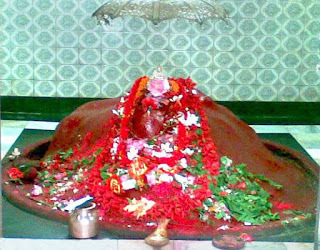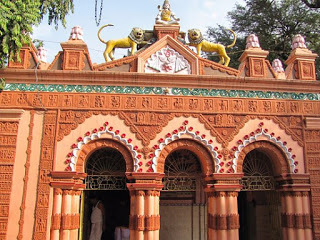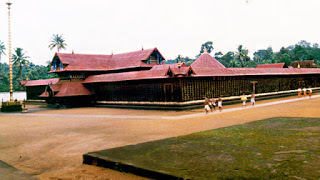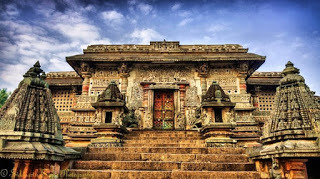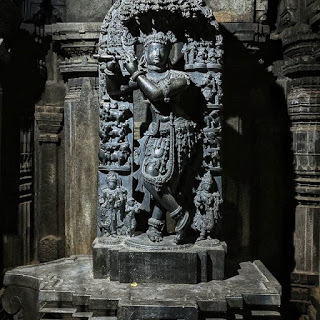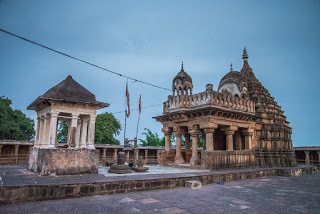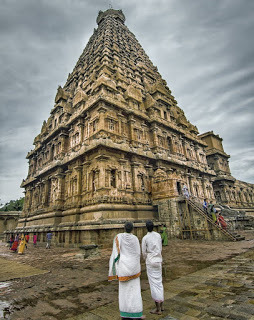Srivalli Rekha (Semi Hiatus)'s Blog, page 78
April 7, 2021
Travel from Gangaikonda Cholapuram to Gautameswar Temple
A world heritage site, the Brihadisvara Mandir
With Dravidian architecture evident
In every chip and dent of the majestic aalyam;
Built in 1035 AD by King Rajendra Chola I
Inspired by his father, Rajaraja Chola I
Who built the Brihadeeswarar aalyam at Thanjavur
 Source: Behance
Source: Behance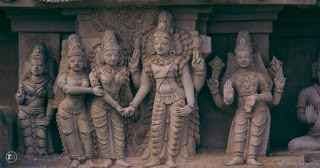 Source: Lost TemplesDedicated to Bhagwan Shiva
Source: Lost TemplesDedicated to Bhagwan Shiva Whose lingam is 18 feet wide and 13 feet tall
With the murti of Nandi
Chiseled in a way to reflect into the sanctum
The lingam is one of the largest in the world
Residing in the sanctum made of Chandrakanta stones
Which keep the Prabhu cool in summer and warm in winter
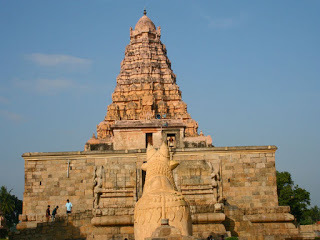 Source: Native Planet
Source: Native Planet*****************************************************************************Gautameswar temple of Manthani, Karimnagar- Telangana
Gautameswar, another form of Bhagwan Shiva
Resides as a lingam,
Close to River Godavari, Bokkala Vaagu*, & Ravula Cheruvu*
Guarded by the murti of a huge Nandi;
No one knows when the mandir was built
That shows traces of Hinduism, Buddhism, and Jainism
The Kakatiya kings are said to have renovated
Adding marvelous sculptures to the old structure
Bringing the place the recognition it deserved
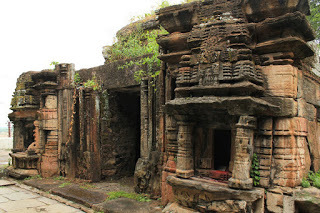 Source: Highway- the Only WayThe name Manthani comes
Source: Highway- the Only WayThe name Manthani comes From a churning pot of buttermilk
To signify the churning of mantras
In this pious place where Vedas were taught
Previously known as Mantrakootam,
The region gets a mention in the inscription
At Dwarakepeetam and Pushpagiri Peetam
By the Jagasguru Sankaracharya,
Who visited the aalayam in the early 6th century AD
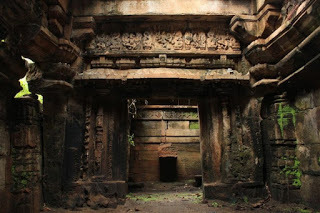 Source: The Mysterious India
Source: The Mysterious IndiaA land once revered for the Vedic literacy and customs
Now lay abandoned, hidden among the overgrown trees
Determined to protect it from further damage
After the nose and ears of the Nandi were
Destroyed by the Muslim invaders
 Source: Telangana 360
Source: Telangana 360Note:
Vaagu is a hill stream or a brook Cheruvu is a lake ******************************************************************************Source: https://temple.dinamalar.com/en/new_en.php?id=451https://www.themysteriousindia.net/ruins-of-gautameswar-temple-manthani/
https://www.telangana360.com/2016/12/manthani-gauthameswara-temple.html
*****************************************************************************
#FreeHinduTemples

Artificial Intelligence and the Future of Power: 5 Battlegrounds- Book Review
4.5 Stars
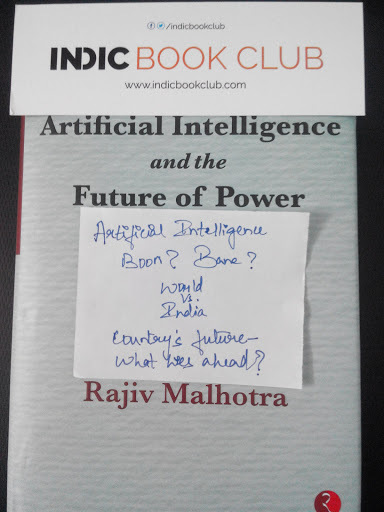
Artificial intelligence is taking the world by storm. It’s the in-thing and a necessity in today’s world. Whether we know it or not, like it or not, AI is here to stay. But what does it mean to the common public?
We know what AI is capable of in the industries. But is the same automation a boon in our lives? How does it affect our future generations? What about data privacy? What about letting a system take control over your thoughts, ideas, opinions, and every aspect of your life? What does it mean to third-world countries? Is India in a position to set terms, or are we destined to be enslaved by the global leaders again, albeit in the name of technology and digital colonization?
The latest release, Artificial Intelligence and the Future of Power: 5 Battlegrounds by Rajiv Malhotra, discusses these topics and much more.
When Indic Book Club sent me this book, I was happy and hesitant. My recent work has been based on the topics of AI and ML. I’ve been reading more and more about how AL, ML, NLP, DL, and NN are going to revolutionize industries. This couldn’t have come at a better time.
However, I was hesitant to read the book because I knew it would look at the topic from the other side of the spectrum. Imagine writing a blog promoting AI and then reading how artificial intelligence makes humans idiots.
Yet, my recent knowledge helped me understand the book in more detail. I could see what the author wanted to explain and show to the reader. This book has a lot of concepts with only limited answers. But the answers are subject to change if the government decides to wake up and understand the seriousness of the situation.
The book has been divided into five categories-
AI and Economic Development and Jobs (unemployment due to AI is not a myth or a distant reality) AI and Global Power (How the US and China are fighting for domination) AI and Psychological Control and Agency (Surveillance capitalism, Data Rights, and Moronization of the masses) AI and Metaphysics (Algorithm vs. the Being) AI and India’s Future (right now, there is very little to cheer about)Intelligence vs. Consciousness
The author talks about how machine learning algorithms are capable of mimicking human emotions to influence and manipulate the masses. That doesn’t mean the systems are conscious or emotional. It only means that the algorithm is pragmatic and smart enough to fine-tune itself based on the constant feedback received and mimic humans in many ways.
One example of this is how virtual assistants and chatbots listen to (read) employees' complaints and offers personalized and emphatic solutions. They are literally replacing the L1 support staff in the IT departments and managing the employee grievances in the HR department.
Now apply the same theory to social media algorithms. The platforms have enough control over us to manipulate our views and mold them accordingly. This leads us to the next question-
Who Decides What’s Normal?
Why do the giants collect and process so much data? They sure aren’t doing us any favors, though they claim to be selfless. Everything we share about us is used against us. Simple. The author highlights this multiple times in the book. It’s ultimately about power politics.
A platform that champions free speech decides what’s free speech and what’s not. How is that possible? But it is being done. They have the best end of the deal:
Data ControlSurveillancePolitical powerWe have hardcore capitalists preaching socialism while filling their vaults with billions. So who’s losing here?
When Facebook tells you that our post violates their standards, but another post in the same vein is acceptable, what does it show? Is the algorithm faulty? Is the person who created the basis for the algorithm biased? Are your views are political inclinations opposing the views of the platform owners?
What do you have to do to continue using the platform? Abide by the rules, obviously. And what happens to your freedom of speech here? When you can question the government for it, why can’t you question a mere social media platform?
The Devastating Cycle
This is one aspect that very few people are willing to talk about. The main concern over adopting AI is that it will take away jobs. The famous assurance is that it will also generate jobs, and the companies will train the employees to use the AI systems.
Do you really think that’s easy? When an MNC invests a huge amount of money in adopting AI, do you think it will spend a similar amount to retrain its employees and pay them higher salaries? Since when did the competitive, ruthless organizations become social workers?
The answer is clear for those who want to see. Automation reduces low-level jobs. AI creates mid to high-level jobs. Why would a company train a daily worker for the job of an AI specialist with higher qualifications?
That leads to job loss, which, in turn, leads to a lack of purchasing power. And that would mean that the goods produced by automation will not have enough sales unless the ultra-rich buy them in hoards.
This results in a self-destruction cycle where AI finally ends up sabotaging itself. But by then, the gap between the poor and the elite would be so wide that breaching it will be impossible. With masses of poor and a handful of powerful rich, we are back at the beginning, where the kings ruled the lands. The fate of the poor lies in the hands of the superrich. Sounds too familiar, isn’t it? AI is not changing anything, per se. It is only increasing the contrast and emphasizing it.
AI and India- What will Happen to Us?
The US is way ahead in terms of AI. China is no exception. In fact, China has bet its entire future on AI. What about India? We are, sadly, at the bottom of the table. All our so-called knowledge and intellect have gone into building data systems for other countries. Our data is bartered to import AI technology that could have been developed within the country.
The author doesn’t shy away from calling a spade and spade and pointing out that the politicians, in their usual political games and appeasement refused to even consider AI as a game-changer, let alone a threat to the nation.
The author points out how our laws are outdated and ineffective when it comes to protecting data. Imagine handing over a credit card and pin number to a neighbor with no formal agreement that the card and the money in the account belong to you and not them.
The author’s analysis and fears are valid when he says that India is at the risk of being recolonized (digitally) because the capitalists want money and the politicians want votes. He does give us some relief when he mentions that there is still hope if the top people acted now and planned for the long term rather than for immediate results.
Reimporting
The author shows five examples of how India, no thanks to the short-sighted policies, has ended up with a raw deal.
Green Revolution- Adopting foreign methods for excess production and now importing traditional Indian organic farming systems from other countries again. White Revolution- Breeding non-Indian cows for excess milk and now tying up with Brazil to get back the Indian breed of cows. Pink Revolution- Excessive meat production, followed by the global countries looking at vegetarianism and veganism that have since long belonged to ancient India. Health and Wellness- Adopting foreign medication with the side effects and ignoring Ayurveda as the world is not looking at natural healing that has been a part of our culture for ages. Linguistics- Ignoring Sanskrit only for the current generation employees to use the language in developing computational systems and models in foreign countries.The author also talks about the identity vacuumthat is an inherent part of most Indians. We neither belong to our tradition nor do we fully associate with the American world. When the basis for both is contrasting, how can someone from one culture identify with another culture? But that’s where we are, creating a pool of pseudo gangs that don’t belong anywhere.
Conclusion
(I know my review is quite long)
Overall, this book is informative and terrifying. That makes a must-read, even though it might give you sleepless nights. A small consolation is that the author says he is working on the next book, where he provides solutions to the problems listed in this one. I hope it comes out soon and the people who make decisions read and understand it.
****
This review has been posted as a part of the Thousand Reviewers Club hosted by the Indic Book Club and Indic Academy. Thank you, Indic Book Club, for a copy of the book.
****
P.S: If you are wondering about the rating, I deducted 0.5 because the book is quite big and someone with limited reading and concentration span will not be able to complete it, though it is critical that they should.
April 6, 2021
Finding Bhakti in West Bengal- Fullhara and Firinghi Kalibari
Fullara Maata has no murti
Except for a stone of 15 feet
To symbolize the lower lip of Devi Sati
That is said to have fallen at Labhpur
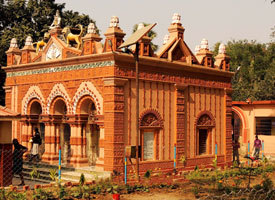
Source: Trip Advisor
A small town in Birbhum district of West Bengal
The land is sacred, one of the 51 pithas
Where Maa Sati’s dead body fell to the earth;
A century-old, the mondir sees countless bhakts
Visiting the site during the Magh Purnima yearly fest
Source: Temple Puhorit
The natural pond beside the murti is no more
A water body that once held blue lotuses;
The same blooms which Prabhu Hanuman collected
For Ram Ji's pooja to worship Maa Durga
Source: WB Tourism
Now Maa Fullara resides,
Alongside her consort Prabhu Vishwesh
Prabhu Bhairav shares space with them
As a murti of the Mahadev sits on a lotus
Let your bhakti bloom
As you bow down in reverence
To Maa Fullara, whose name means to bloom
*************************************************************
Firinghi Kalibari, Kolkata- West BengalLocated in the busy streets of Kolkata
Is a mondir more than 500 years old
Maa Kali in her magnificent avatar
Resides in this tiny mondir
Giving her blessings to the bhakts
Who trust her with their lives
Why the name Firinghi you wonder, don’t you?
It comes from Hensman Anthony, a Portuguese
Who was fondly called Anthony Firingee,
By the locals for his bhakti and belief in Maa Kali
The man married a widow, Soudamini
Converted to Hinduism, embracing Santan Dharma
And composed verses dedicated to Maa Siddeswari Kali
 Source: Tour My India
Source: Tour My IndiaHis faith was rewarded,
Written for the future generations to see
On a plague at the temple
That belongs to 1498 AD (905 Bengali Year)
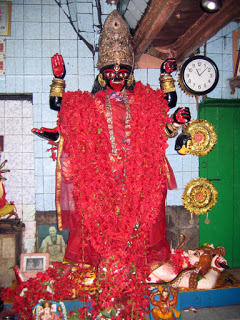 Source: Nilkantho
Source: NilkanthoBuilt by a Srimanta Dom
A man from the lowly class with high values
Being the poojari and the bhakt
He treated people with smallpox
Requesting Devi Sitala to spare their lives.
 Source: Mondir
Source: Mondir*****************************************************************************
Sources:
https://rgyan.com/en/temples/firinghi-kalibari
https://www.tourmyindia.com/states/west-bengal/firinghi-kalibari-temple-kolkata.html
https://mondir.wordpress.com/asia/india/west-bengal/kolkata/firinghi-kalibari/
http://birbhum.nic.in/tourism/BirbhumTourism.pdf
https://www.pilgrimaide.com/temples/attahas-fullara-devi-temple
****************************************************************************
#FreeHinduTemples

April 5, 2021
Ettumanoor Mahadevar Temple- The Land of Saundarya Lahari
In the land of deer, Manoor stands a mandir
Where Vyasa muni and the Pandavas
Bowed to Bhagwan Shiva
 Source: YatraDham
Source: YatraDhamSomewhere in Kottayam in 1542 AD
The aalyam was reconstructed
The Dravidian mural paintings
As proof of the timeline on walls
Inside and outside the main entrance
In a typical structure, familiar in the region
The Mahadevar mandir boasts of owning
Seven and a half golden elephants
Said to be donated by the Travancore Maharaja
Taken out once a year during the Arattu festival
On the Thiruathira day
Source: Kerala TourismGold is not the reason for its fame, though;Golden words of bhakti were woven here
By none other than the great Adi Sankaracharya
The philosopher and spiritual leader,
Who gave us Soundarya Lahari
By writing the pious words in this mandir.
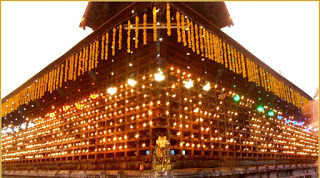 Source: Temple Purohit
Source: Temple Purohit*******************************************************************************
Sources:
https://www.rvatemples.com/listings/ettumanoor-mahadevar-temple/
https://www.templepurohit.com/hindu-temple/ettumanoor-mahadeva-temple/
https://www.keralatourism.org/temples/kottayam/ettumanoor-mahadeva
*******************************************************************************
#FreeHinduTemples

April 4, 2021
Meet Vishnu at the Durga Temple and Bow Down at Draksharamam
In the capital of the Chalukya Dynasty
Sometime in the 4th century,
Lay the historic holy site Aihole,
Alongside the Malaprabha river
 Source: Karnataka Tourism
Source: Karnataka TourismPulakeshi II, a follower of Jainism
Dedicated the aalyam to Bhagwan Vishnu
Building a total of 120 temples in the vicinity
Durga mandir, it is famously called
Deriving the name from the Durg nearby
Flaunting the Dravidian architecture
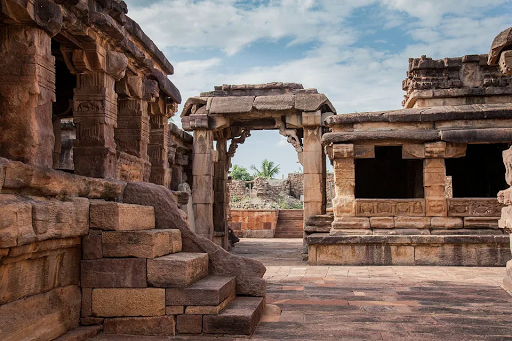 Source: Hisour.comRavi Keerthi, the Jain poet praises the king
Source: Hisour.comRavi Keerthi, the Jain poet praises the kingFor his victory against Harshavardhana
The inscriptions you see are as old as 364 CE
In the sacred languages of the land- Sanskrit and Old Kannada
 Source: RVA Temples
Source: RVA Temples********************************************************************
Draksharama, East Godavari- Andhra Pradesh
Mani Kyamba is her name
The left cheek of Devi Sati
12th part of her body that fell to the earth
Upon her death in the sacred fire
Daksha Prajapathi- ruled the land,
The father in law of Prabhu Shiva,
Turning it into a pilgrim spot
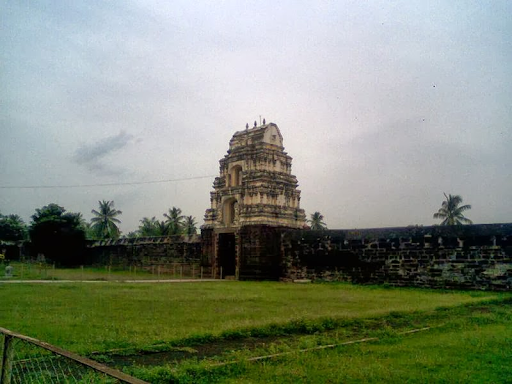 Source: Temple Details
Source: Temple DetailsHowever, it was the Tarakavada
That gave the region its title
When the shiv linga broke into five
With a piece falling at Draksharama
Four entrances it has in four directions
The prakaram and gopuram
Lead to the magnificent aalayam
Praised by Vyasa muni in the Skanda Purana
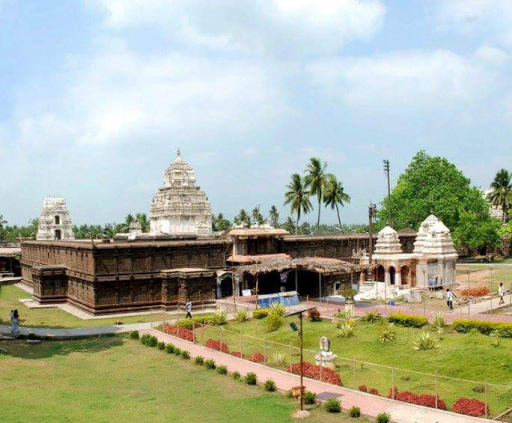 Source: 1 Temples.com
Source: 1 Temples.com*********************************************************************
Sources:
http://www.karnatakatourism.org/tour-item/durga-temple-aihole/
https://www.astroved.com/astropedia/en/temples/south-india/durga-temple-aihole
https://eastgodavari.ap.gov.in/tourism/temples/lord-bhimeswara-swami-temple-draksharama/
*********************************************************************
#FreeHinduTemples

April 2, 2021
Chanting at Chennakesava Continues to Chausath Yogini Mandir
What does one say about the Hoysala architecture?
The majestic carvings on the rocks, telling tales of the past
Vishnuvardhana won the war over the Cholas
Built the Kalasagar, to dedicate his victory
To Chenna Kesava, the beautiful Bhagwan Vishnu
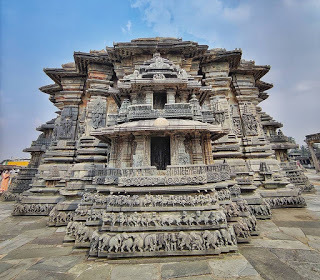 Source: Lost Temples
Source: Lost TemplesMore than 1000 artists carved this soapstone marvel
Chiseling and polishing each murti to utter perfection
Source: VedicFeed and Siddharth Sagar
48 pillars and an intricately carved ceiling
The Navrang Mandapa houses wonders beyond imagination
The 16th pillar Mohini boasts of 16 fluted star-shaped pillars
While the Narasimha pillar brings
The ferocious deva to life on stone
As the pillar rotated on its own axis
Before the shikara was dismantled
By those who still failed to ruin its beauty
Source: Lost Temples
************************************************************************
Chausath Yogini Temple, Jabalpur- Madhya PradeshNot one, not two, but 64 murtis adorn
The Chausath Yogini Aalayam
The attendants of Devi Durga, they are
Surrounding Prabhu Shiva, who stands in the midst of all
Yuvaraja II of the Kalachuri dynasty
Built the mandir as a tribute
To the yoginis who stood to protect the territory
With 84 pillars, the aalayam rose high in 1000 AD
Only to be destroyed by the Mughal invaders
Source: Hindu Temples of India
But the future generations were in luck
When two centuries later,
Queen Alhanadevi restored the structure
Building a Gauri Shankar mandir at the center
The inscriptions date by 1155 CE, proof of her faith
The largest Yogini aalayam survived and thrived
A sight for the eyes near River Narmada and Marble Rocks
Climb 108 steps, dear bhakts, bow to the yoginis
Breathing and alive in their sparkling murtis.
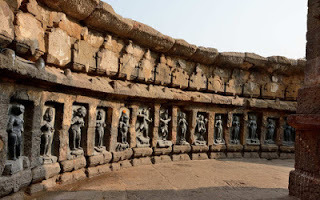
Source: Navrang India
**********************************************************************
Sources:
https://www.inditales.com/chennakesava-temple-belur-karnataka/
https://www.karnataka.com/belur/chennakesava-temple/
https://www.nativeplanet.com/jabalpur/attractions/chausath-yogini-temple/
**********************************************************************
#FreeHinduTemples

April 1, 2021
Brihadeeswarar to Burhanath via Bambleshwari Temple
At 216 feet high, the Vimanam stands tallest in the world
A mandir tower carved out of a single rock;
80 tons heavy, with intricate carvings
Capable only by the blessed sculptors
Brihadeswara aalayam set a record
And flaunted its glory in just 6 years
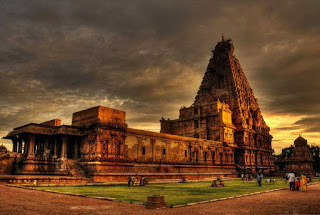 Source: Thanjavur TourismRajaraja Chola I, on the 275th day
Source: Thanjavur TourismRajaraja Chola I, on the 275th day Of his 25th year of rule in 1010 AD
Walked into the pranganam
To worship the linga of Bhagwan Shiva
Source: Lost TemplesPeruvudaiyar, they call the Eshwar
Bowing down in reverence to seek his blessings
As the aalayam walls bear the proof in scriptures
The fall and fortunes of the city in Thanjavur
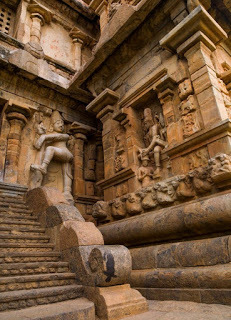 Source: Lost Temples
Source: Lost Temples************************************************************************Burhanath Temple- Bihar
Shiva he is, the bhagwan with a snake
As a garland adorning his blue neck
Swayambhu his lingam was, years ago in Bihar
Dudheshwara Mahadeav the bhakts named him
As Vashishta muni prayers echoed in the Burhanath mandir
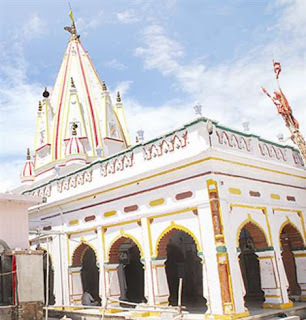 Source: Jagran.com
Source: Jagran.com***********************************************************************Bambleshwari Temple- Chhattisgarh Raja Veerasen and his queen prayed for a child
Gave birth to Madasen, an heir to the throne
Building an aalayam 2200 years ago
On the top of the hill, at 1600 feet high
To show their gratitude and bhakti
Bhagwan Shiva with his dear consort, Parvati
Grant boons to those who have faith his presence
Not easy it is to get the darshan;
A thousand steps of the test, one has to pass
On the rocky hill to reach the top
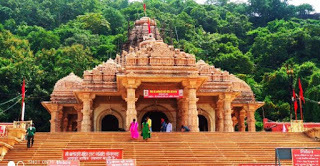 Source: Trip AdvisorDevi Bambleshwari gives her love
Source: Trip AdvisorDevi Bambleshwari gives her love To those in need, by making her appearance
To become a guiding light and show the right path
As she saved King Vikramaditya
From taking his life years and years in the past
And even today we see, bhakts gathering around her
During Kavar and Chaitra
Asking for their wishes to be fulfilled
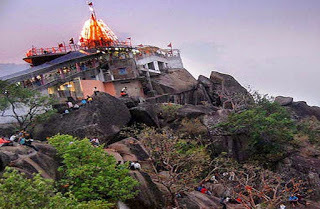 Source: Patrika.com
Source: Patrika.com*********************************************************
Sources:
http://thanjavur.info/thanjavur-tourism/brihadeeswarar-temple-thanjavur/
https://en.wikipedia.org/wiki/Burhanath_temple
https://rajnandgaon.nic.in/tourist-place/maa-bamleshwari-temple/
https://en.wikipedia.org/wiki/Bambleshwari_Temple
*******************************************************
#FreeHinduTemples

March 31, 2021
From Arasavalli to Airavatesvara Temple
Indra, the Devendra, is here there everywhere
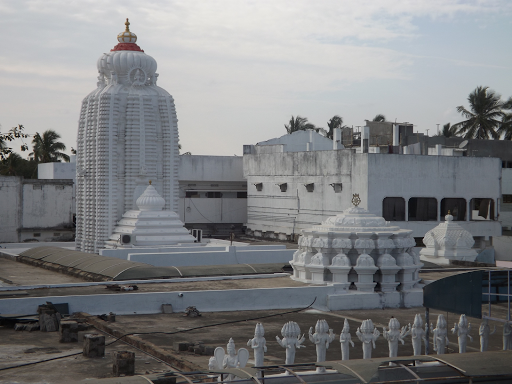 And back in the 7th century
And back in the 7th century His Vajrayuda created a pond- Indrapushkarini
Bringing pilgrims to take a dip
In the mighty Sun Lord’s presence
Ruling a remote village, Arasavalli, in Andhra Pradesh
Source: Wikimedia
The lord of the world and light, Surya Deva
Rides his majestic chariot, his three consorts by his side
Installed by the great sage Kasyapa
Dreamt by Devendra
The temple stands unique
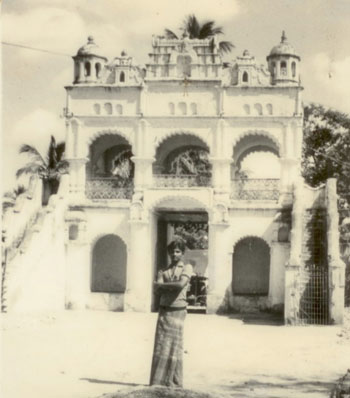 Source: Arasavalli Temple Website
Source: Arasavalli Temple Website
As the rays of the sun
Touch the feet of the murti
Twice a day for a handful of minutes
In Spring and Autumn
The welfare of mankind was the goal
From nook & corners came the unfortunate
In the hope to cure the diseases of the eye and skin
Oh, God of Health, Suryanarayana Swami,
May your rays shine bright on the devotees
And heal the pain forever.
************************************************************************Airavatesvara Temple, Kumbakonam- Tamil Nadu
Oh, Airavata, the holy white elephant
You dip into the Cauveri River’s channel
For your clear skin to shine again
Giving the temple your name- a legacy
 Source: Tamilnadu-Favouritism
Source: Tamilnadu-FavouritismRajaraja Chola II, oh, great king
The 12th century saw your glory
In every chip and dent of this Karakkoil-
A temple built after a temple’s chariot
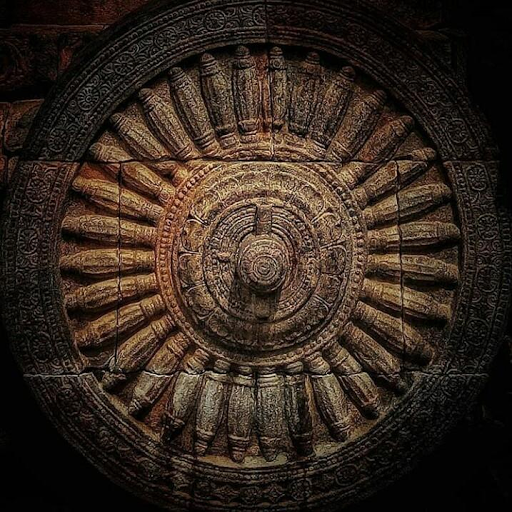 Source: Desi Thug
Source: Desi ThugThe musical stairs stand to a side
Their sa re ga ma pa da ne
Resounding in delight on each step of the rock
Entertaining Lord Shiva and Lord Yama
As they share this pious space
With Gods and Goddess that guide us through
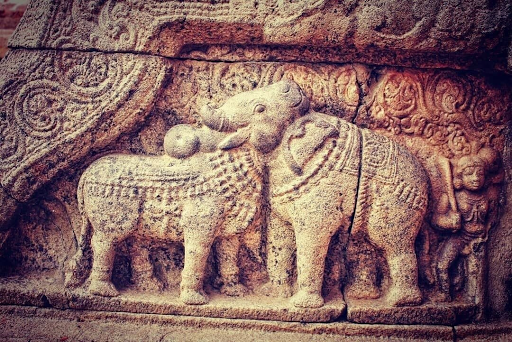 Source: Vertigo Warrior
Source: Vertigo WarriorPlundered, damaged, and destroyed
By the Malik Kafur, Khasrua Khan, & Tughlaq
The temple survived to be revived again
By the Vijayanagara Empire;
Yet the ruins lay nearby- a brutal reminder
Of the invaders, we are forced to glorify
Source: Deepa Shree************************************************************************Sources:
http://www.arasavallisungod.org/abouttemple.html
https://www.atlasobscura.com/places/optical-illusion-at-airavatesvara-temple
https://www.rvatemples.com/listings/airavatesvara-temple/
************************************************************************
#FreeHinduTemples
Small Things Like These- Book Review
Genre: Historical Fiction, Irish Literature, Magdalene Laundries 4.5 Stars
True to the title, Small Things Like These is a small book that shows how small things matter the most. We aren’t talking about the small pleasures of life here. The book deals with the history of Magdalene Laundries (or the asylums). The story is fictional, but it could very well be true. In fact, I wonder how many were lucky enough to have their life turned the way it happens in the book.
If you are wondering what I’m talking about, you will first need to read about Magdalene Asylums set up in different parts of Europe and Australia. Understanding the subtle nuances of the book is not possible without knowing the dark history of the topic.
When a friend asked me to read about Magdalene Laundries, I looked up on Google and remembered that I came across this topic before. There was an episode of Miss Prynne Fisher Mysteries (in the Australian setting) that showed how the lives of the girls in these asylums were no less than a nightmare.
Coming back to the book, Small Things Like These is set in 1895 Ireland during Christmas. It shows Bill Furlong’s life in the then present-day as a successful coal merchant. The story takes us back to his childhood, artfully contrasting the miseries of the unfortunate girls forced to stay at the Magdalene laundries with no chance at the future.
The story is atmospheric, emotional, and wonderful. Not because it shows the truth of how the Catholic Church ensures silence from the crowd. But because it underplays the power to perfection. Bill’s emotions and thoughts dominate the book. His life is proof of how things could have been better.
In three scenes (two short and one medium-sized), the author brings out the mirror and places it right in the brutal asylum with huge walls and padlocked doors. There is no escape except death. And death came in abundance, but not when the girls wanted it.
To see the correct image in the mirror, you need to know what the asylum stood for. There is a note at the end of the book, but I recommend reading the history before picking up this book.
Don’t ignore this book, though. The language is beautiful, and the author’s control over her narrative is evident. She could have made this into an extended drama. But she chose not to. For me, that’s the biggest plus of the book. Though I’m a fan of happy (and proper) endings, I know this book ended at the right place. It leaves us wondering how things would go next, though we know what is likely to happen.
Overall, I would say, go read the book.
I received an ARC from NetGalley and Grove Atlantic Press.
P.S: I can’t wait to see the cover they’d design for this book.
#SmallThingsLikeThese #NetGalley
March 27, 2021
The Tuscan House- Book Review
Genre: Historical Fiction, WW II4 Stars

The cover and the blurb of the book got my attention, and despite the page count (400 pages), I requested an ARC. The Tuscan House is a story set during WW II in Italy. We have Richard, a Quaker pacifist, an Inglese (from England), Fosca, and her young son, Giampiero, and many other characters who play different roles in the book.
The story, as such, starts with Richard trying to overcome PTSD (he worked with Friends Ambulance Service treating and helping the wounded on all sides) after the war has subsided. We see him deciding to move to the same place, a small town in Tuscany, which was the reason for his trauma.
Then enter Fosca and her son. Almost immediately after a dead body is found in the tobacco house (rather ruins), Richard buys to make it his home. When she reveals that the body belongs to Simonetta, a series of questions arise.
Fosca starts to reveal her story to Richard, trying to understand who had killed her dear friend, an active member of the resistance team.
What I like about the story is the narration that goes at a consistent pace. It did feel a little slow at times, but there is a lot of backstories to cover. I probably could have finished this book earlier, if not for countless delays that slowed my reading. Still, I could pick up the book where I left it more than a couple of days ago. And there was no confusion. That, for me, is a plus. The author has good control and command over her story, and it shows.
When it comes to historical fiction, research is important. But knowing what to include in the book and when to stop dumping information is even more crucial. The author scores here as well. It’s not surprising since her previous works are all historical fiction. I do intend to read them someday soon.
The setting is perfect; the descriptions are neither sparse nor excess. Some characters have less prominence than others, but that’s expected.
What I wanted to be better was that the blurb sounds a lot like a semi-thriller. But this book hardly has any of it. Yes, there are questions and a bit of action towards the end. However, the storyline is set by then. It doesn’t create that sense of urgency in the reader.
The best way to read the book is to consider it detailed historical fiction and not focus too much on the mystery and suspense part. Even the action scenes from the past don’t make your heart race. The narrative style doesn’t allow for it.
Overall, this is bittersweet as most WW II historical fictions are and will make a good choice for those who like stories set in the countryside with enough importance given to human emotions. Oh, yes, it’s got food and wine too (after all, we are in Tuscany).
I received an ARC from NetGalley and Bookouture.
#TheTuscanHouse #NetGalley

